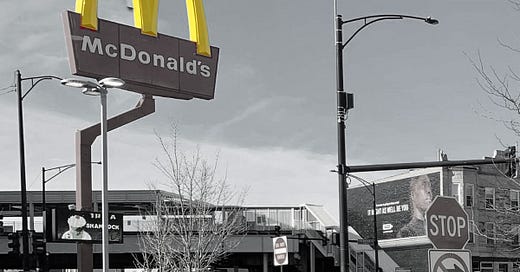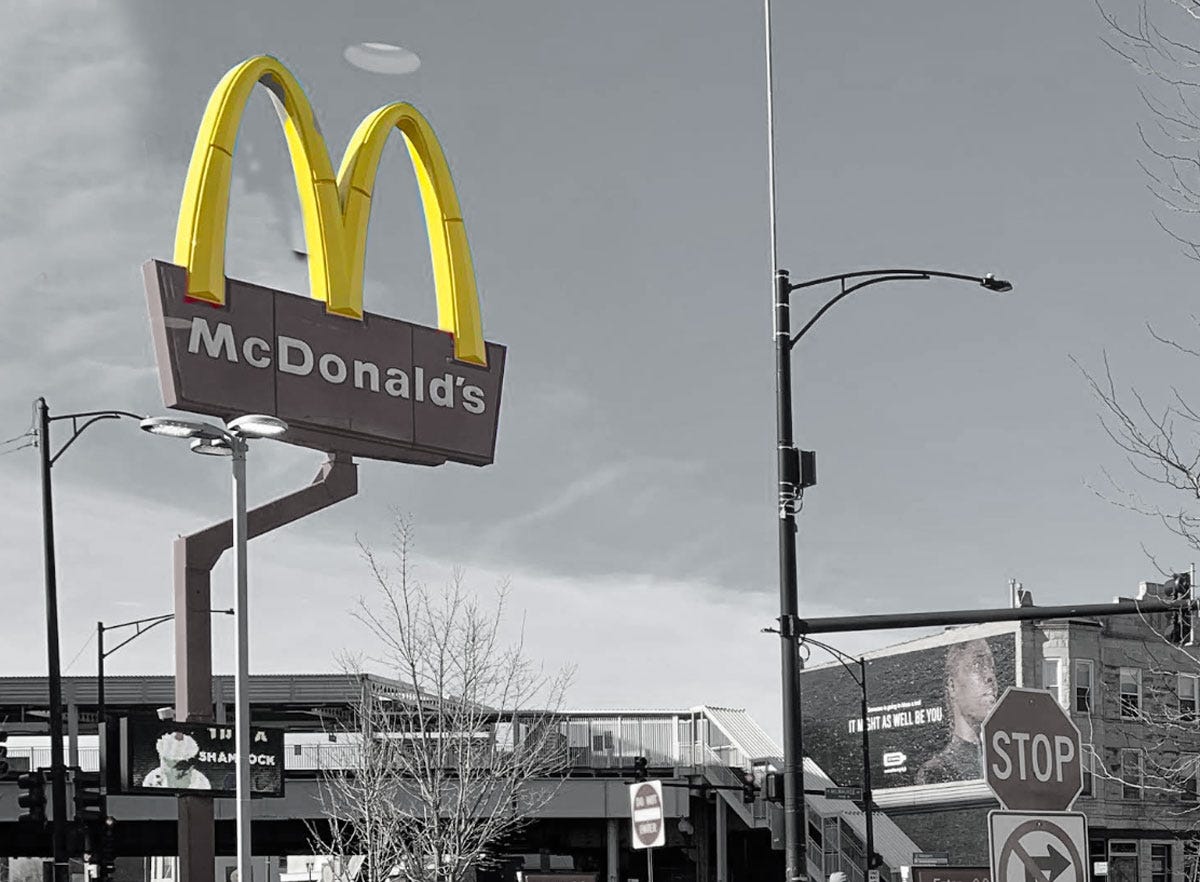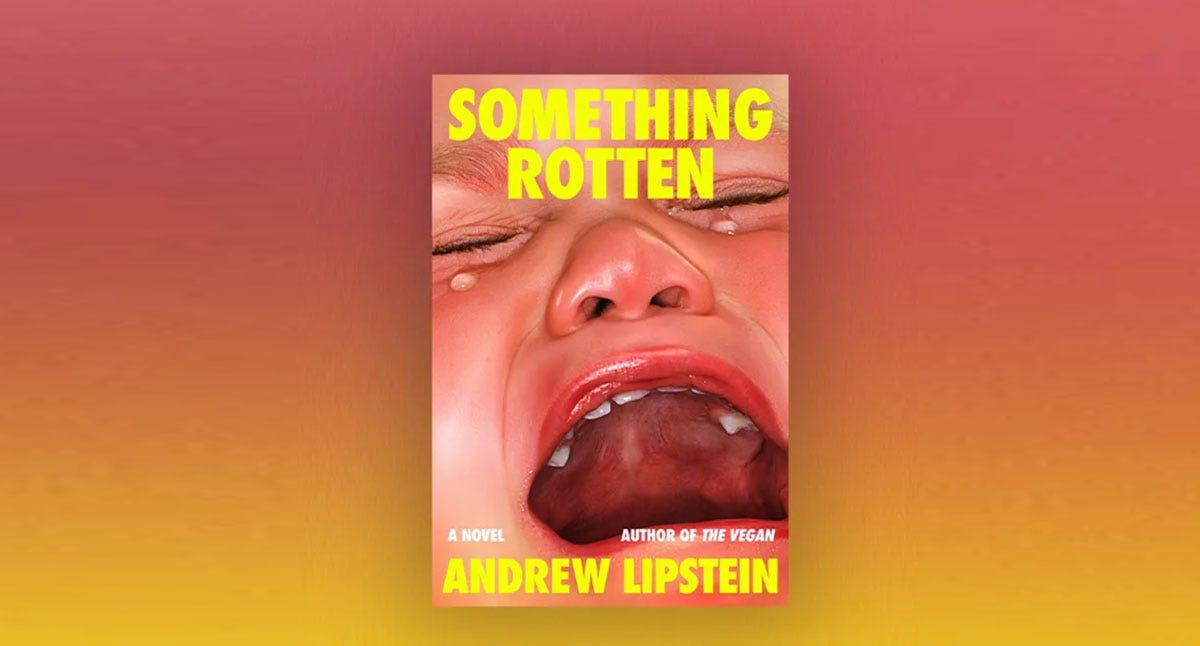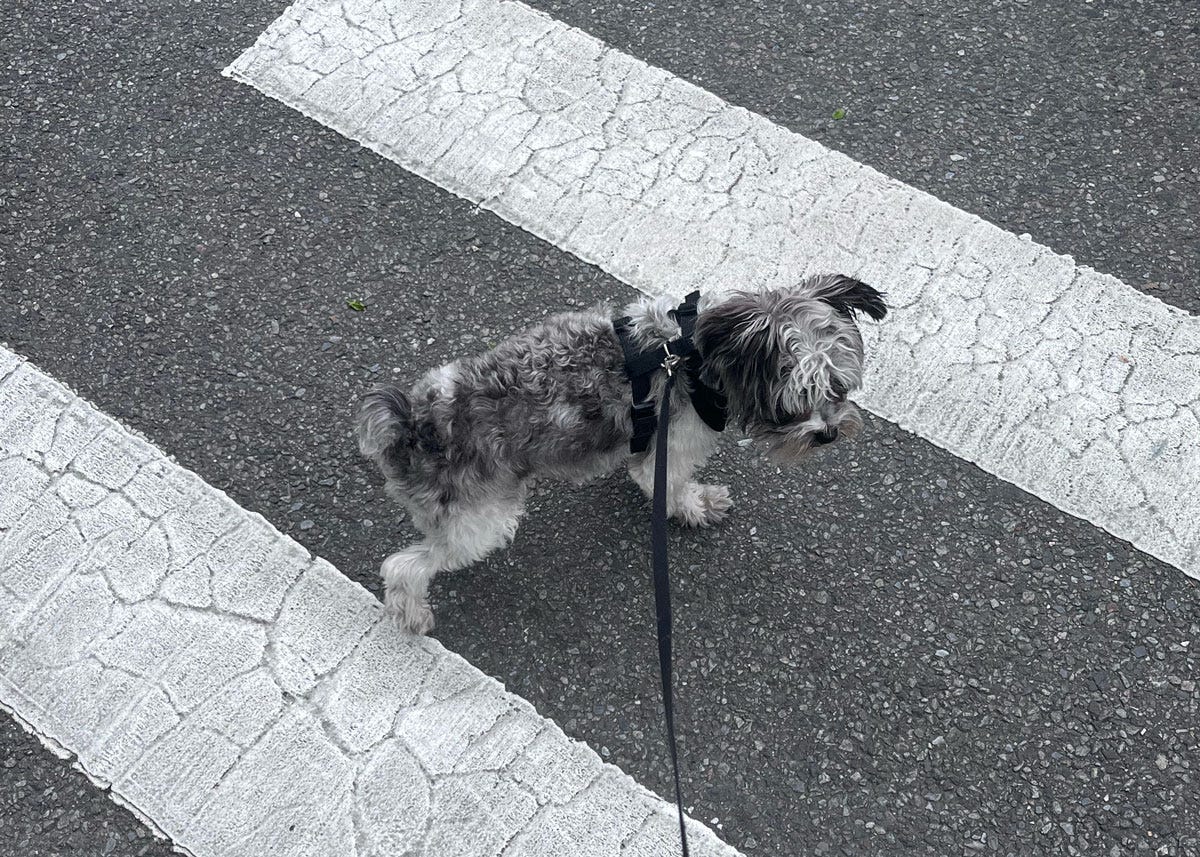Why I Left Chicago
On leaving cities, losing patience, and watching rich couples fight. A memoir excerpt, book review, and May’s bonus playlist.
I try to make one playlist a month, collecting all the songs enjoyed over the past 30 days. In May, I’m collecting songs for June, and so forth. I got too far ahead and was already making a July playlist. So, instead, I’m sharing a bonus playlist for May.
xo, Thomas
Bonus Monthly Playlist
Excerpts from a Memoir: Why I Left Chicago
The first time I did mushrooms, I was alone. My friend Lou and I had planned to take them together after work, but when I got home, she texted that she was too busy and needed to reschedule. I, however, had been anticipating it all day and didn’t want to wait. I decided to take just a little, enough to test the waters, feel inspired, play some music, maybe write a new song. I imagined the drugs would gift me an epiphany. I’d create the song of the century. I shoved a stem and a cap into a kiwi and bit in.
I paced the apartment, waiting for something to happen. I put on a suit jacket, for reasons I still don’t know. Nothing. I sat on the couch. I was bored. I went up to the attic, where all my instruments were, and sat in front of the piano. I stared at the keys, willing myself to play. My hands didn’t move. I started to cry. Then I fell to the floor.
My roommate Scott came upstairs and found me like that. I couldn’t get up. I started laughing, then crying again. He rolled his eyes and said he was going out. I figured I should go, too.
I needed to pack. Pack like I was leaving for good. I threw an apple, a pen, and a book into a tote and left. It was raining. I had not prepared for that. I walked into a church. Sanctuary. A crowd of people surrounded me and told me I couldn’t be there. I left and cursed God.
I wandered for what felt like days, though probably thirty minutes. I was in Logan Square, walking down Altgeld, past Talman and Washtenaw. Everything was familiar, easy to navigate. I circled around then turned left onto Milwaukee and walked, crying, feeling misunderstood and distant from everything, while also more tethered to the city than ever. The epiphany hadn’t come.
Eventually, I reached Milwaukee and Western, by the Blue Line and a McDonald’s. I stared at the golden arches and memories surged through me. The first time I got off the Western stop to visit a girl, before I even lived in Chicago. It all felt so foreign back then. Then later, living nearby with a girlfriend and staring at the sign each morning as I waited for the train to take me to school. Another year, biking past it with friends en route to Wicker Park and whatever party we were too excited for. Trying to order from the drive-thru without a car when the dining room was closed and we were too drunk to care. Driving past it in a minivan filled with band gear on our way to play an empty venue.
I saw a pattern. The pattern of a life repeating itself in the same place.
How many more versions of me would that McDonald’s see? And what kind of life was that?
I should have been writing music. I should have skipped the drugs and focused on what mattered. But maybe the truest pattern was the one I hadn’t noticed yet: comfort slowly turning into complacency. Familiarity becoming something that dulled the edge of time.
Standing under the overpass of the Western Blue Line, I pulled out the book and scribbled on the inside cover:
How have I become
Just someone
Just someone
Because the simple ways
Are good
So good
So good
Whether I knew it then or not, that was the night I decided to leave Chicago. To push myself toward something more. Something unfamiliar. A year later, I left it all behind, traveled the world like a vagabond, and eventually ended up in New York.
Book Recommendation: Something Rotten by Andrew Lipstein (Farrar, Straus and Giroux)
“It’s easy to say that people deserve to know the truth.”
Cecilie, a New York Times reporter on maternity leave, heads to Copenhagen with her husband, Reuben, a disgraced former NPR host, to reconnect with friends and family from her hometown. But their summer abroad takes an unexpected turn. On day one, Cecilie receives urgent messages from friends: Jonas—her first love—is sick, and it’s possibly terminal. He’s refusing treatment and only willing to listen to Mikkel, their mutual friend, who seems uninterested in convincing him otherwise.
Meanwhile, Reuben, still reeling from the scandal that ended his career (a Zoom mishap too embarrassing to recover from), finds himself questioning his masculinity and purpose. He strikes up an unlikely friendship with Mikkel. The two bond over beers, bad decisions (they both shave their heads; only one ends up with a regrettable neck tattoo), and shared confusion about adulthood. But the friendship grows increasingly uneasy, and Reuben starts to question Mikkel’s motives.
As Cecilie reconnects with Jonas and tries to steer him toward a second chance, the stability of their summer begins to unravel.
Something Rotten is a slow burn at first, alternating chapters between Cecilie’s third-person point of view and Reuben’s. As the story progresses, their distinct paths begin to echo each other. Both are nearing forty, both are stuck between nostalgia and reinvention, and both are unsure whether staying in Denmark could be a way forward or just another detour. Is it about cheaper daycare and healthcare? The desire to reinvent? Or the pull of unfinished pasts?
Reuben considers a fresh start in Denmark, but isn’t sure it’s possible:
“...there was no such thing as becoming someone new. Not when you were a few years from forty, had a family, and had already had your chance. New experiences don’t change who we are, they only show sides of ourselves that were there all along.”
Cecilie wonders if leaving Copenhagen was a mistake. As she spends more time with Jonas, she fantasizes about the life she could have had, one shaped by patience rather than ambition. But the more she tries to grasp the past, the more untethered she feels in the present.
I found myself deeply connected to the themes in this book, feeling stuck, obsessing over the future, and questioning past decisions. Something Rotten doesn’t offer easy answers. Instead, it suggests that most of it doesn’t matter. The universe is chaotic and unclear; all we have is now. As Jonas reflects:
“Hope makes you live in the future, but a lot of people, myself included, would do better to try to stay in the present.”
Happy to be Here: Bad Day Couple
Is it wrong to delight in a couple’s misery? Especially when it fuels my daily smile?
I was on a break from work the other afternoon, walking my dog, Mr. Darcy, through Nolita, when I spotted them: a couple in their mid-twenties, dressed in the glossy ease of generational wealth, their clothes too fresh, their hair too considered.
The girl wore a heavy pout. No question she was upset. At what? The good weather? The luxury of a 1 PM stroll? Her boyfriend? He was trying everything to snap her out of it: smiling with his blinding white teeth, rubbing her bare shoulder, stepping into her eyeline like a clown auditioning for forgiveness. She wasn’t having it.
As we crossed paths, I remembered how many times I’d played that part, cheering up a sulky partner, pushing good vibes against a wall of tension. I remembered the emotional gymnastics. The moment when, drained from trying, my mood would turn sour, too. And magically, that’s when they’d perk up. Or worse, the moment they'd snap with a “joking” comment that stung.
Suddenly, I was the one in a mood. Now it was their turn to fix things.
I’m grateful to recognize that pattern now and avoid it. If someone’s in a bad mood, I let them ride it out. I’m not auditioning for emotional martyrdom anymore. Growth, dear readers.
Mr. Darcy and I rounded the corner toward home, and who did we see? The same couple. Only now she was grinning, clutching a matcha. On the other hand, he looked hollowed out, somewhere far from himself.
I smiled. They, my friends, still had some growing to do.







